[March 8 is International Women’s Day] Actions towards a society where women can fulfill their potential: Women’s leadership for the future in Uganda and Cambodia
2021.03.05
March 8 is International Women’s Day. Actions are being taken around the world for women’s participation in society, improvement of their status, and elimination of their discrimination. We introduce powerful women from Uganda and Cambodia who are taking actions and demonstrating leadership in various initiatives to change society into one where everyone can live in comfort.
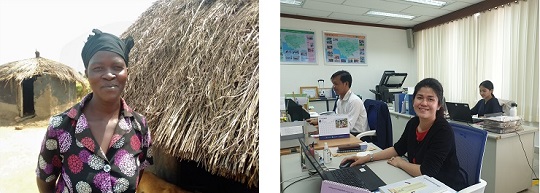
Left: Ms. Akera Jackline, a farmer group leader in a village in Northern Uganda
Right: Ms. Nak Chan Boline of JICA's Cambodia Office, who is working to support economically disadvantaged Cambodian women who have been forced to return home from working in neighboring countries due to the COVID-19 pandemic
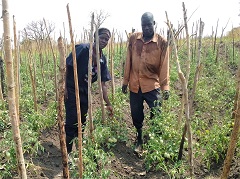
Ms. Akera Jackline (left) teaching cultivation skills to a male farmer standing next to her
In Unyama Sub-county, Gulu District in Northern Uganda, Ms. Akera Jackline, a group leader, teaches farmers how to grow tomatoes and how to use pesticides and fertilizers in a tomato field. She participated in JICA’s “Northern Uganda Farmers’ Livelihood Improvement Project” and learned how to grow tomatoes and cabbage, manage household income and expenditure, and improve nutrition. Today, together with her group members, she is a model farmer providing guidance to neighboring farmers and 28 groups in other regions.
In Northern Uganda, where traditional culture and customs dictate that women do not have the authority to make decisions in the home and must obey men, JICA’s project was initiated in 2015 with the aim of improving the livelihood of farmers while ensuring that all family members live happily. Both male and female farmers work together to learn vegetable cultivation techniques and methods of selling harvested vegetables. The project also included training on the division of roles between men and women in the household. They learned that men and women can work together to improve the quality of their daily lives, including household management and nutrition while improving their income.
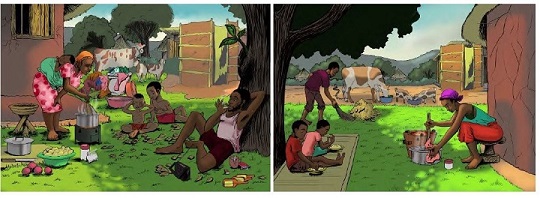
In the training, this illustration was shown to the participants, and they discussed the issues and good points of their respective families and the division of household chores
As the project progressed, the stereotype that only women should do housework and childcare was dispelled, and men gradually began to participate in household chores and take care of children. The men also began to discuss and decide with the women how to spend their earnings, something that had been mainly decided by the men. In one group, a vegetable farm that was run solely by women was established.
At a Field Day, which is a forum for the farmer group to showcase their achievements, neighbors gathered to hear about their experiences through role plays, dances, and songs. In Paicho Sub-county, Gulu District, the female members of the farmer group acted out a role play where they learned how to cultivate and sell better quality cabbages at the marketplace and how these cabbages sold at an amazing rate. After watching the performances, some women in the audience said they wish they could be just like those women performing to share their experience.
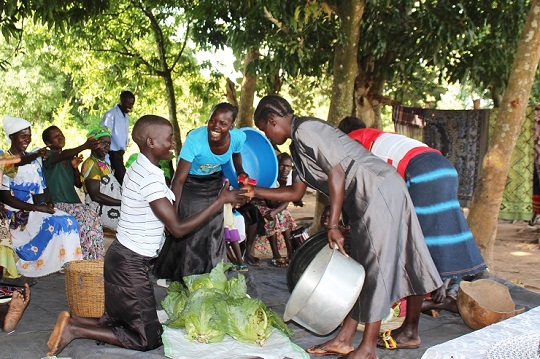
A scene from a role play where the women share their experience of growing huge cabbages and selling them at high prices at the marketplace
The mindset of the men participating in the project also changed. When they saw that it was more profitable for women to sell their vegetables at the market, they began to take women’s opinions into account. Men also began to be seen picking weeds, which was previously considered as women's work.
In Uganda, with the spread of COVID-19, the number of instances of men committing violence against women in the home has been increasing due to various stresses. Under such circumstances, Mr. Apila Thomas, a man who acquired knowledge through gender training, is working with the village chairperson as a solution provider in the community where domestic violence is occurring.
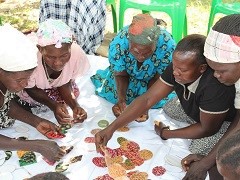
A workshop for men and women to brainstorm together about nutritionally balanced meals by combining cards of locally grown products
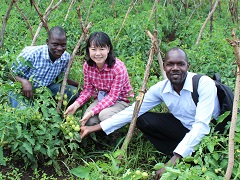
Expert Yamashita (center), and agricultural extension officer (right) and project staff (left) monitoring a farmer’s tomato farm
YAMASHITA Riai, a JICA expert who has been involved as a gender specialist since the beginning of the project, says, “Northern Uganda experienced a civil war that lasted nearly 20 years from 1986, and we needed to carefully listen to the voices of the farmers about the negative effects of the war.” Not only was there discrimination against women, but some people faced discrimination when they returned to their villages after the end of the civil war, because they had been kidnapped and turned into child soldiers during the conflict, and were forced to kill their relatives.
“With the view to create a society where everyone can participate without being left behind, the project values the diversity of people, young and old, men and women, and those who have suffered from the civil war. It values the process of confronting the issues that each individual faces in their daily lives, thinking about these issues together, and dealing with them,” says Ms. Yamashita. She is currently leading the project in close contact with the people on the ground, such as producing teaching materials for farmers to learn from each other, since she cannot visit Uganda amidst restrictions on travel.
“As a result of the COVID-19 pandemic, women who had left Cambodia to work in countries such as Thailand, Malaysia, and Korea, lost their jobs and returned to their home country all at once. However, after returning, they were unable to find work and could not feed their families. I strongly felt that there must be something I could do to support them, so I planned this survey,” says Nak Chan Boline, National Staff of JICA Cambodia Office.
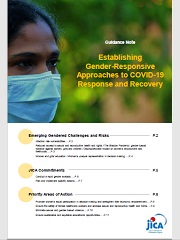
Last year, JICA prepared a “Guidance Note” (in Japanese and English) summarizing the measures against COVID-19 using a gender-responsive approach. Ms. Boline also referred to this Guide repeatedly when preparing her proposal for these surveys
It has become clear that the lives and livelihoods of women and girls in developing countries, whose social security and employment opportunities are more limited than those of men due to gender-based discrimination, have been severely affected by the spread of COVID-19. For this reason, JICA is conducting surveys to ascertain what risks women and girls in developing countries are exposed to and what kind of support they need, in order to implement specific measures. We called on our offices in various countries, and Ms. Boline was one of those who raised her hand.
“For me, conducting this survey is a huge challenge because I have to consult with JICA headquarters many times to prepare proposals for the survey. However, I am engaged in this survey because I have a strong desire to assist women who are economically deprived.”
In Cambodia, due to cheap labor and the lack of work opportunities at home, about 10% of the working population goes to other countries to work as migrants. In particular, many women in rural areas are migrant workers, but they are also victims of human trafficking.
Ms. Boline has been working at JICA’s Cambodia Office for about 15 years. Currently, she is engaged in projects related to women’s economic empowerment, including support for women who are involved in problems associated with migrant workers. She is using this experience to take a leadership role in these surveys in collaboration with local NGOs and National Committee for Counter Trafficking (NCCT), Ministry of Interior.
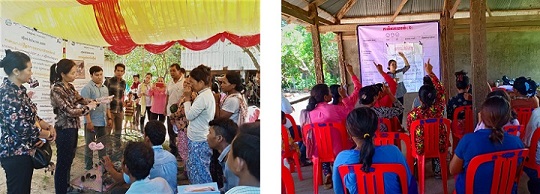
Workshops on business skills (left) and gender training (right) are conducted for the economic empowerment of women (photo courtesy of PGM-WEE)
Face-to-face interviews have begun in two provinces, Kampong Cham and Thbong Khmom, to identify what kind of support is needed for women who have returned home due to the COVID-19 pandemic.
“While clarifying specific issues, we will also provide support for the women to learn skills to get jobs. We hope that the results of this survey will be reflected not only in projects to improve women’s livelihoods after COVID-19 but also in national policies to support women.”
Looking ahead to the post-COVID-19 period, Ms. Boline’s words are filled with determination.
scroll